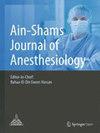Abiraterone, a rare cause of severe perioperative hypokalemia with unusual presentation as aphonia and quadriparesis: a case report
IF 0.5
Q4 ANESTHESIOLOGY
引用次数: 0
Abstract
Oral Abiraterone acetate is a novel antineoplastic agent approved by the FDA for the treatment of metastatic prostate cancer. Abiraterone is an irreversible inhibitor of the 17α-hydroxylase (CYP17) enzyme complex resulting in a reduction of androgens and corticosteroids. It may cause mineralocorticoid excess syndrome; hence, it is prescribed with steroids. Here we describe a case of postoperative severe hypokalemia with unusual presentation in a patient after spine surgery in which abiraterone with prednisolone was continued preoperatively. Anesthetic concerns about the perioperative administration of abiraterone have not been reported in the literature. An 80-year-old male with a known case of metastatic prostate cancer was posted for spine surgery under general anesthesia. Surgery was uneventful and the patient was extubated after ensuring adequate muscle power and respiratory parameters. Postoperatively, the patient developed aphonia, quadriparesis, and respiratory distress leading to reintubation. After evaluation, severe grade 4 hypokalemia was found to be the causative factor. The patient recovered well after potassium and steroid supplementation. Low potassium and cortisol levels indicate a diagnosis of abiraterone-induced hypokalemia. Patients on abiraterone require more stringent and vigilant monitoring of potassium and cortisol levels. In such circumstances, it might be advantageous to add additional steroids or substitute alternative steroids.阿比特龙,一个罕见的原因严重围手术期低钾血症不寻常的表现为失音和四肢瘫痪:1例报告
口服醋酸阿比特龙是一种被FDA批准用于治疗转移性前列腺癌的新型抗肿瘤药物。阿比特龙是17α-羟化酶(CYP17)酶复合物的不可逆抑制剂,导致雄激素和皮质类固醇的减少。它可能导致矿物皮质激素过量综合征;因此,它与类固醇一起开处方。在这里,我们描述了一个病例术后严重低钾血症与不寻常的表现在病人脊柱手术后,阿比特龙与泼尼松龙继续术前。关于阿比特龙围手术期给药的麻醉问题尚未在文献中报道。一名80岁男性转移性前列腺癌病例在全身麻醉下接受脊柱手术。手术顺利,患者在确保足够的肌肉力量和呼吸参数后拔管。术后,患者出现失音、四肢瘫和呼吸窘迫,导致再次插管。经评估,发现严重的4级低钾血症是致病因素。患者在补充钾和类固醇后恢复良好。低钾和皮质醇水平提示诊断为阿比特龙引起的低钾血症。服用阿比特龙的患者需要更严格和警惕地监测钾和皮质醇水平。在这种情况下,添加额外的类固醇或替代类固醇可能是有利的。
本文章由计算机程序翻译,如有差异,请以英文原文为准。
求助全文
约1分钟内获得全文
求助全文

 求助内容:
求助内容: 应助结果提醒方式:
应助结果提醒方式:


